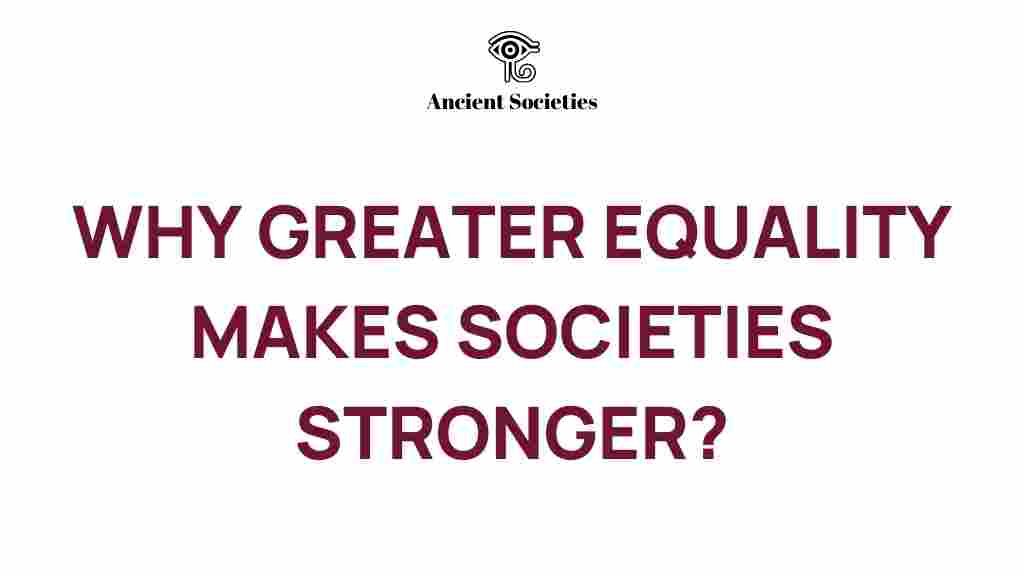Unveiling the Strength of Societies: The Case for Greater Equality
In today’s rapidly changing world, the concepts of equality, social justice, and equity are more crucial than ever. The strength of a society is not solely measured by its economic power or technological advancements but by how inclusive and equitable it is for all its members. This article explores the vital connection between greater equality and the resilience of communities, illustrating how progress in these areas leads to a stronger, more cohesive society.
Understanding Equality in Society
At its core, equality refers to the state of being equal, especially in status, rights, and opportunities. In the context of society, it encompasses various dimensions, including:
- Economic Equality: Fair distribution of wealth and resources.
- Social Equality: Equal access to social privileges, rights, and opportunities.
- Cultural Equality: Recognition and respect for diverse cultural identities.
- Political Equality: Equal participation in political processes and decision-making.
Greater equality fosters a sense of belonging and community, which is essential for social cohesion. When individuals feel valued and included, they are more likely to contribute positively to society, enhancing its overall strength.
The Role of Inclusivity in Building Resilience
Inclusivity is a cornerstone of any strong society. By ensuring that all voices are heard, societies can tap into a broader range of perspectives and experiences. This diversity leads to:
- Enhanced Problem-Solving: Diverse teams are more innovative and effective at solving problems.
- Stronger Community Bonds: Inclusivity fosters relationships and trust among community members.
- Increased Participation: When everyone feels included, more people engage in civic activities.
Ultimately, a society that prioritizes inclusivity becomes more resilient. It can withstand challenges, adapt to changes, and recover from crises more effectively.
Steps to Promote Equality and Inclusivity
To build a stronger society rooted in equality and social justice, consider the following steps:
- Educate and Raise Awareness:
Start by educating your community about the importance of equality and inclusivity. Host workshops, seminars, and discussions that highlight issues of social justice.
- Encourage Diverse Representation:
Promote diversity in leadership positions within organizations, governments, and community groups. Representation matters in decision-making processes.
- Implement Fair Policies:
Advocate for policies that promote equity in areas such as education, healthcare, and employment. Policies should aim to level the playing field for all community members.
- Foster Community Engagement:
Encourage community members to participate in local initiatives and decision-making. Engaged communities are empowered communities.
- Support Local Organizations:
Collaborate with and support organizations that focus on promoting social justice and equity. These organizations often have the tools and knowledge to drive change effectively.
Troubleshooting Common Challenges
Implementing strategies for greater equality and inclusivity can encounter obstacles. Here are some common challenges and tips to address them:
- Resistance to Change:
Many individuals may resist changes to the status quo. To combat this, emphasize the benefits of inclusivity and social justice through data and personal stories.
- Lack of Resources:
Organizations may struggle with limited resources. Seek partnerships with local businesses or grant funding to support initiatives.
- Miscommunication:
Ensure that messaging around equality and inclusivity is clear and accessible. Use multiple channels to reach different audience segments.
- Tokenism:
Avoid superficial efforts that do not lead to genuine change. Focus on meaningful engagement and representation.
Examples of Successful Equality Initiatives
Many communities around the world have successfully implemented initiatives focused on equality and social justice. Here are a few notable examples:
- Community Land Trusts: These non-profit organizations help maintain affordable housing and promote community control over land use.
- Diversity and Inclusion Programs: Companies that implement training programs aimed at promoting equity in the workplace often see increased employee satisfaction and productivity.
- Local Food Initiatives: Programs that focus on food equity ensure all community members have access to healthy food, improving overall public health.
These initiatives demonstrate that when communities prioritize equality and inclusivity, they lay the groundwork for lasting change.
Conclusion: The Path Forward
As we reflect on the case for greater equality, it is clear that fostering an inclusive society is not just a moral imperative but a pathway to resilience and progress. By embracing social justice and equity, we can build communities that are not only stronger but also more vibrant and dynamic. The strength of a society lies in its capacity to uplift every member, ensuring that all voices are heard and valued.
Let us work together to create a future where equality is a reality for all, leading to a more united and resilient society. For more insights on building better communities, visit this resource. To learn more about ongoing initiatives, check out this organization.
This article is in the category Society and created by AncientSocieties Team
